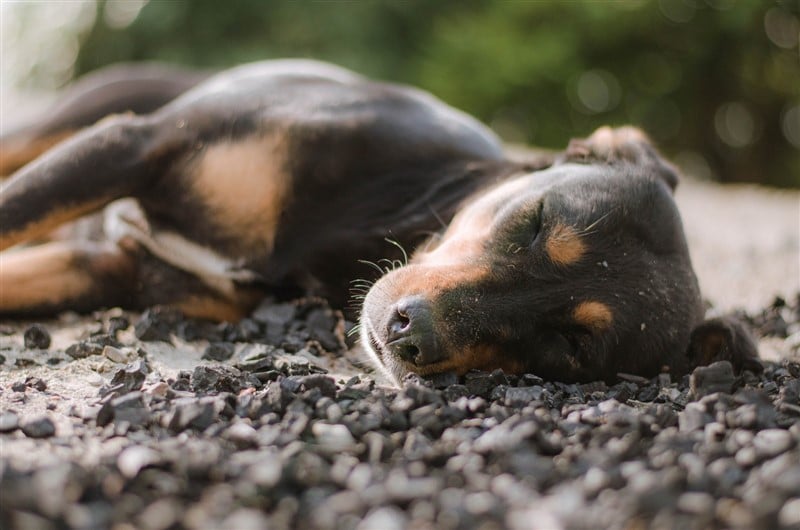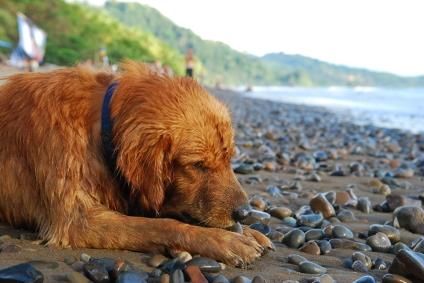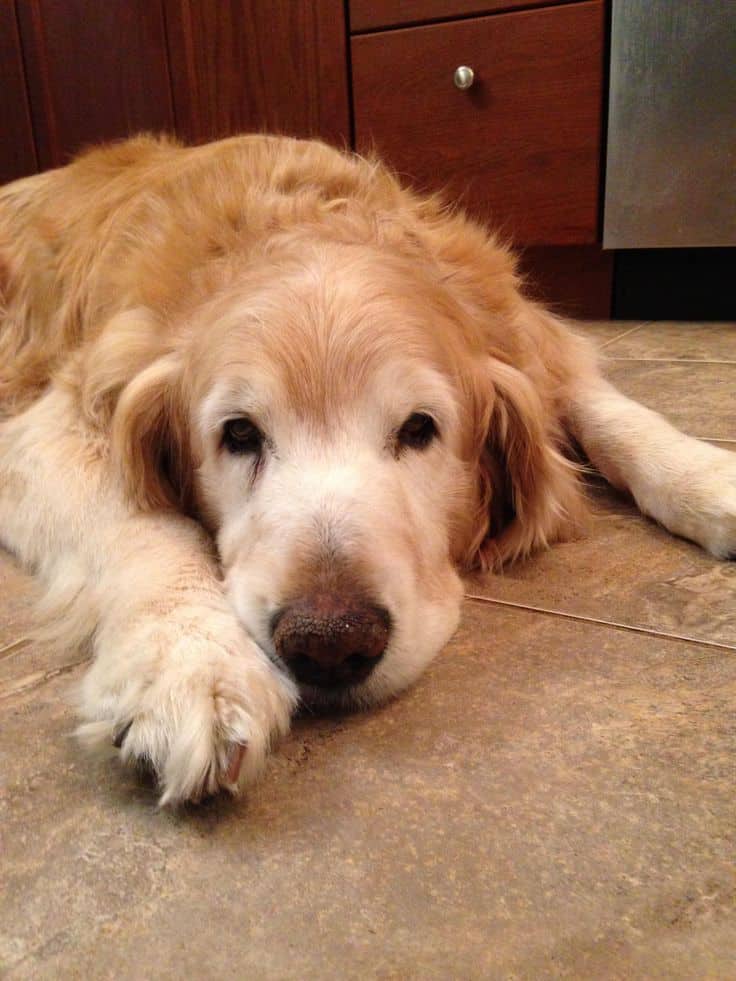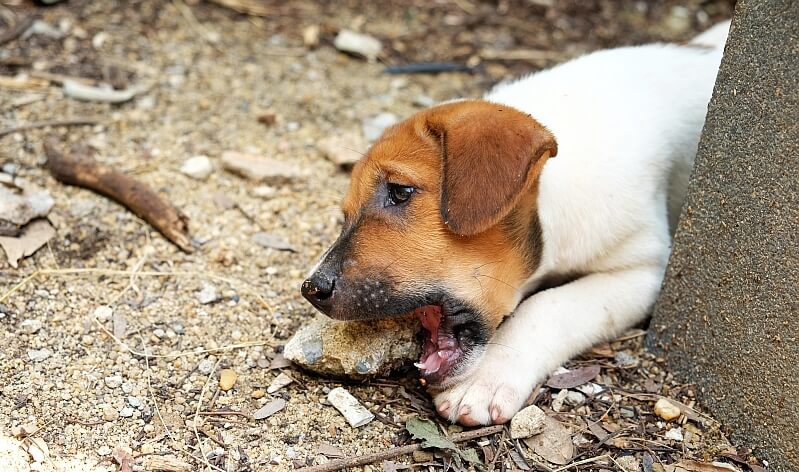Stones, books, magazines, dirt, batteries, and children’s toys are probably the last things you want your dog to chew or ingest.
While curiosity may play a big role in such eating habits (especially in puppies), it is not a desirable behavior and might become very dangerous when your canine companion swallows something like a rock.
Things may even get worse when the rock that your dog swallows is too big to pass through his gastrointestinal tract, leading to health complications that may turn serious.
Speaking of complications turning serious, what’s the worst that can happen to your dog if he swallows rocks?
In other words….
Can Dogs Die From Eating Rocks?

Well, rock-eating is certainly not ideal behavior in dogs! But, is it fatal?
Yes, it can be fatal but it also depends…
Some of the factors that can influence whether eating rocks can be fatal to dogs include the size and shape of the rock in question, the age and size of the dog, and the chemical composition of the rock.
First things first, you need to understand what happens when your dog ingests something—be it food or non-food item like a rock.
When everything is normal in your dog’s gastrointestinal (GI) tract, the food he eats should travel down the esophagus to his stomach.
In the stomach, the food takes about 10-12 hours before it is passed through the pyloric sphincter to the dog’s small intestine.
But when he ingests a non-food item like a rock, the process is neither straightforward nor simple.
If he swallowed a small and smooth rock, it is highly likely to pass through the dog’s digestive tract without any harm.
On the flip side, if it is irregular or too large to exit the dog’s stomach or other parts of his digestive tract, your dog can become seriously sick.
In particular, if no immediate action is taken, your dog may encounter a range of health risks, including:
1. Chocking
The first serious complication that you are going to notice in your dog is choking.
You are probably going to see your dog coughing and having difficulty in breathing.
He may drool a lot, gag and retch repeatedly, or show extreme distress.
He may also paw at his mouth and face in a bid to try and dislodge the rock he may have swallowed
In a worst-case scenario, he may lose consciousness due to the inability to breathe.
His skin and mucus membrane may turn pale at this stage.
2. Intestinal Blockage
Another potential complication to expect is GI tract blockage.
In most cases, this complication will prevent the passage of food and fluids through your dog’s GI tract.
As result, food, fluids, and gases will build up behind the blockage.
And if enough pressure builds up, a process called peritonitis may occur i.e your dog’s intestine may rupture and leak its content in your dog’s body.
In terms of severity, GI obstruction may be partial or total/complete. The former case may cause vomiting and diarrheas while the latter may even stop your pup from eliminating.
Other symptoms to expect in either case include bloating, abdominal pain, constipation, nausea, fever, and difficulty in going to the toilet.
If left untreated, these symptoms may metamorphose into something serious and may even cause death.
3. Perforated Colon or Stomach
If the rock that your dog has ingested has sharp edges, it may cause perforation as it passes through the dog’s digestive tract.
Signs of a perforated stomach or colon include pain, discomfort, bloody stools or vomiting of blood.
4. Upset stomach
Any kind of rocks—even small pebbles—can irritate your dog’s stomach, especially if he ingests copious amounts. He can experience vomiting, diarrhea, or both.
5. Poisoning
The rocks that your dog has consumed may also contain chemicals that are toxic to dogs.
If that’s the case, your pup will start vomiting, having diarrhea, drooling, and skipping his food (loss of appetite).
If you suspect that the rocks that your dog has ingested are poisonous or contaminated, call your vet immediately or the pet poison helpline right away.
Remember to carry a sample of the rock to help your vet with treatment.
Avoid inducing vomiting yourself as it can worsen your pup’s condition by damaging his digestive system.
6. Necrosis
And if the rocks that your dog has ingested exert too much pressure in his stomach, it can affect blood flow and circulation to various organ tissues, causing them to die—a process called Necrosis.
As the tissues die, they release toxic enzymes into your pup causing shock, peritonitis, and even death.
7. Chipped Teeth
Finally, even if your dog doesn’t swallow the rocks, chewing on hard ones can chip or break his teeth.
This may force you to part with a handsome amount of money for dental work. Sometimes it may necessitate teeth removal.
What’s more, most dental works in dogs are done under anesthesia, which possesses additional risks.
How Long Can A Rock Stay In A Dog’s Stomach?

While there are very real chances that rocks that your dog ingests may become lodged in his digestive tract, he may get lucky and either vomit up the rocks or pass them next when he takes a poop.
The second scenario brings us to a frequently asked question among dog parents who have had this rock-swallowing predicament: How long can a rock stay in a dog’s stomach?
The short answer is: anything that a dog ingests will usually take 10-24 hours to move from his mouth through his entire digestive tract.
However, there are a few facts that you should keep in mind:
- Some objects may take much longer—even months!
- Some rocks may be too big to pass through your pup’s digestive tract. If that’s the case, they will cause intestinal obstruction
- For rocks that fail to pass, the longer they stay in your dog’s intestine, the more damage they may do to your pup’s health.
Your dog’s system isn’t going to digest a rock. So, if he swallowed rocks and he has not vomited or eliminated them with poop after the mentioned duration, know that there is a problem.
The next course of action to take in such a case is to get yourself an appointment with your vet immediately.
A vet will do x-rays, run blood tests, and even carry out surgery if necessary to ensure safe removal of the rocks inside your pup’s body.
Give Rock Eating Behavior the Seriousness It Deserves

Can dogs die from eating rocks? If you’ve been following, the quick answer is a YES.
However, not every dog that eats rocks is going to die or will have major health issues….
Some dogs will probably live through all the potential risks that we’ve covered above!
That said, the most important thing is to ensure that the scenario doesn’t repeat itself or become a habit.
If your dog ingests rocks repeatedly, you shouldn’t take it lightly.
Your dog may not suffer any serious condition now but it is prudent to get to the bottom of the issue and stop this bad behavior once and for all.
Check out this post for ideas on how you can stop your dog from eating rocks going forward: Natural Remedies for Pica in Dogs
Besides breaking the habit, it would also be a great idea to have a solid plan should the strategies mentioned in the above post fails because for some dogs, the habit may not be broken before some things are fixed first.
As an Amazon Associate, we may receive a small commission from qualifying purchases but at no extra cost to you. Learn more. Amazon and the Amazon logo are trademarks of Amazon.com, Inc, or its affiliates.

